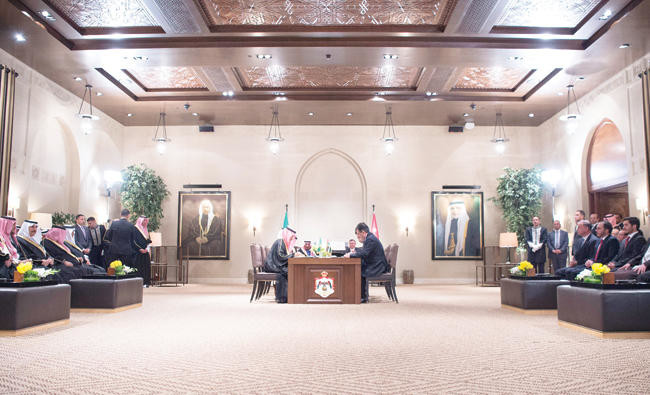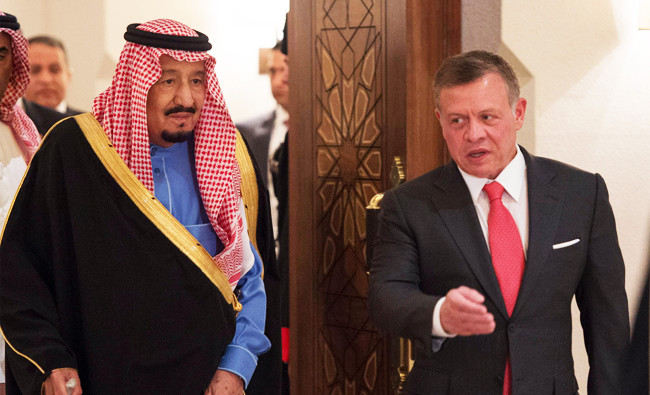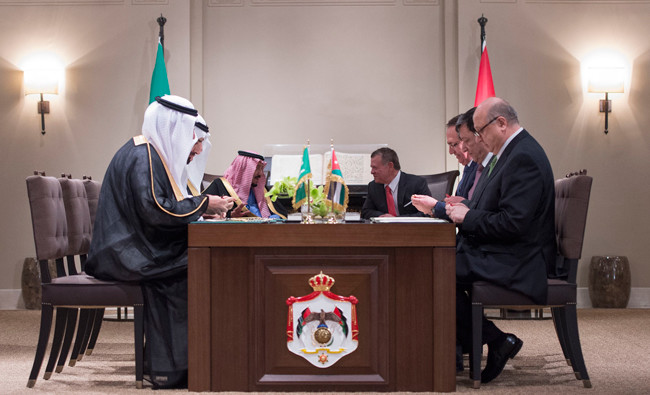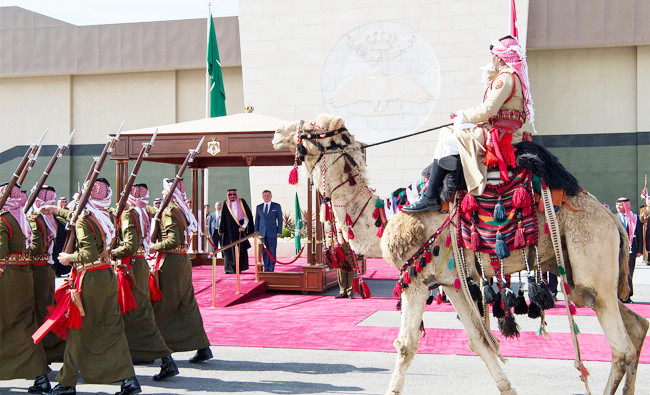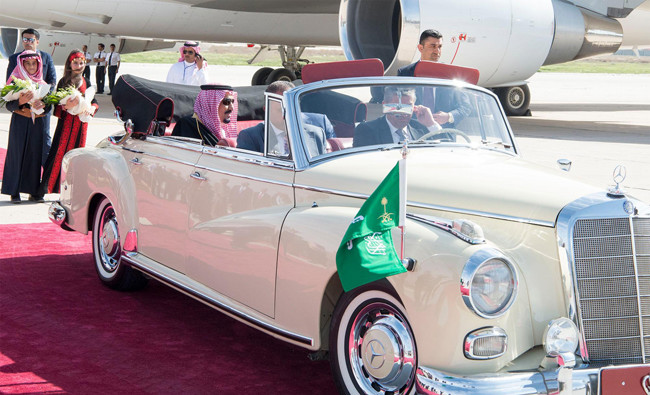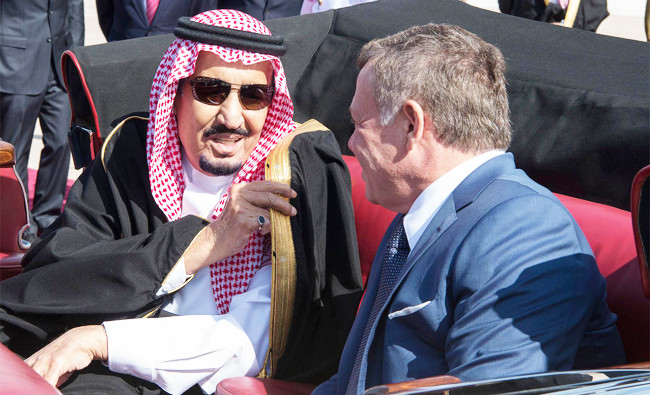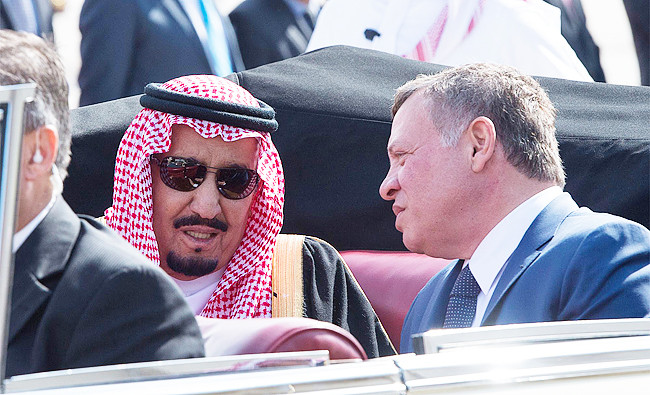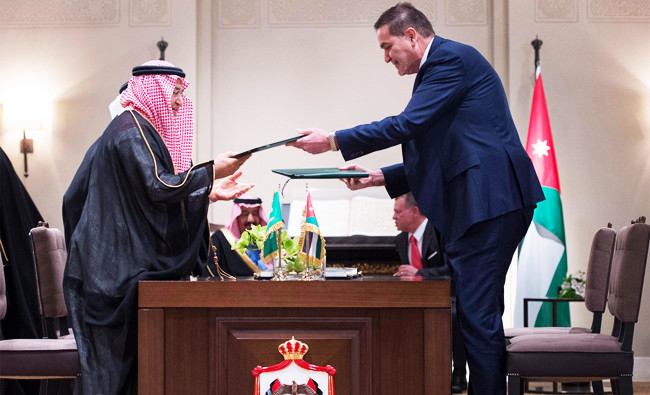AMMAN: Saudi King Salman and Jordan’s King Abdallah on Monday attended the signing ceremony of a number of agreements, memoranda of understanding (MoU) and joint investment deals worth billions of dollars.
The agreements, signed by government officials from the two sides, include establishing a Saudi-Jordanian investment company valued at some $3 billion, an MoU in postal services offered to Haj and Umrah pilgrims between Saudi Post and its Jordanian counterpart and an agreement on environmental protection. Also signed were agreements on an executive program in the cultural field, a social executive program, an MoU in the health care sector and an MoU in the housing sector. Also included were signings for an investment protection agreement and a SR393.75 million ($105 million) loan agreement to rehabilitate and maintain the Jordanian desert highway that links Amman with the southern city of Aqaba.
The two sides also signed an MoU to study the feasibility of building two reactors operated by integrated-unit technology in Jordan to produce desalinated water and electricity.
The Saudi Press Agency (SPA) and Jordan’s Petra news agency signed a joint cooperation MoU that will enable them to exchange expertise.
Several agreements and MoUs were signed with the Jordanian medical private sector to establish a medical treatment and rehabilitation center in Riyadh, and a project to build and operate a solar station with a capacity to produce 50 megawatts near the eastern Jordanian border.
Earlier, Mohammad Momani, Jordan’s minister of state for media affairs and government spokesman, stressed strong bilateral ties and joint visions on various political, economic and social issues of mutual concern.
“The Saudi-Jordanian Coordination Council, which is headed by Prince Mohammed bin Salman, deputy crown prince and minister of defense, and Jordanian Prime Minister Hani Al-Mulqi, has been created as part of joint coordination in all aspects,” Momani said in a statement on Monday. “We will invest in King Salman’s visit to further boost the currently distinguished ties.”
In statements to Arab News, Reem Badran of Saudi-Jordanian Business Council (SJBC) said Saudi investments in Jordan amount to more than $14 billion, including more than 850 investment projects.
“The Saudi Development Fund has contributed to funding development projects in Jordan by managing and overseeing the Saudi share as part of the GCC (Gulf Cooperation Council) $5 billion 2012-2016 grant, which was given during the GCC meeting in 2011,” she said.
“So far, around $1.154 billion has been spent on different development projects intended to improve the living conditions of the population.”
Jordan’s former minister of state for media affairs, Samih Maaytah, told Arab News on Monday that Saudi Arabia plays an important role not only in the Arab world but also internationally.
Maaytah added: “Over the past year, officials from both countries have been meeting frequently in preparation for this important visit. The Jordanian leadership is keen to keep coordination at all levels with Saudi Arabia at its best, considering that the two countries have common grounds and interests when it comes to the crises that have been hitting our region since 2011.”
King Salman, King Abdallah witness signing of key pacts in Amman
King Salman, King Abdallah witness signing of key pacts in Amman
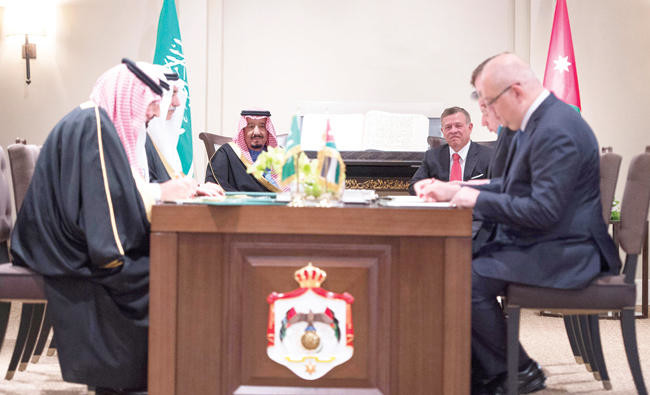
Iraq PM says Mosul airport to open in June, 11 years after Daesh capture

- On June 10, 2014, the Daesh group seized Mosul
BAGHDAD: Iraqi Prime Minister Mohammed Shia Al-Sudani on Sunday ordered for the inauguration of the airport in second city Mosul to be held in June, marking 11 years since Islamists took over the city.
On June 10, 2014, the Daesh group seized Mosul, declaring its “caliphate” from there 19 days later after capturing large swathes of Iraq and neighboring Syria.
After years of fierce battles, Iraqi forces backed by a US-led international coalition dislodged the group from Mosul in July 2017, before declaring its defeat across the country at the end of that year.
In a Sunday statement, Sudani’s office said the premier directed during a visit there “for the airport’s opening to be on June 10, coinciding with the anniversary of Mosul’s occupation, as a message of defiance in the face of terrorism.”
Over 80 percent of the airport’s runway and terminals have been completed, according to the statement.
Mosul’s airport had been completely destroyed in the fighting.
In August 2022, then-prime minister Mustafa Al-Kadhimi laid the foundation stone for the airport’s reconstruction.
Sudani’s office also announced on Sunday the launch of a project to rehabilitate the western bank of the Tigris in Mosul, affirming that “Iraq is secure and stable and on the right path.”
Turkiye’s top diplomat meets Syria’s new leader in Damascus

- Hakan Fidan had announced on Friday that he planned to travel to Damascus to meet Syria’s new leaders
- Turkiye’s spy chief Ibrahim Kalin had earlier visited the city on December 12, just a few days after Bashar Assad’s fall
ANKARA: Turkiye’s foreign minister Hakan Fidan met with Syria’s new leader Ahmed Al-Sharaa in Damascus on Sunday, Ankara’s foreign ministry said.
A video released by the Anadolu state news agency showed the two men greeting each other.
No details of where the meeting took place in the Syrian capital were released by the ministry.
Fidan had announced on Friday that he planned to travel to Damascus to meet Syria’s new leaders, who ousted Syria’s strongman Bashar Assad after a lightning offensive.
Turkiye’s spy chief Ibrahim Kalin had earlier visited the city on December 12, just a few days after Assad’s fall.
Kalin was filmed leaving the Umayyad Mosque in Damascus, surrounded by bodyguards, as broadcast by the private Turkish channel NTV.
Turkiye has been a key backer of the opposition to Assad since the uprising against his rule began in 2011.
Besides supporting various militant groups, it has welcomed Syrian dissenters and millions of refugees.
However, Fidan has rejected claims by US president-elect Donald Trump that the militants’ victory in Syria constituted an “unfriendly takeover” of the country by Turkiye.
Syria’s de facto ruler reassures minorities, meets Lebanese Druze leader

- Ahmed Al-Sharaa said no sects would be excluded in Syria in what he described as ‘a new era far removed from sectarianism’
- Walid Jumblatt said at the meeting that Assad’s ouster should usher in new constructive relations between Lebanon and Syria
DAMASCUS: Syria’s de facto ruler Ahmed Al-Sharaa hosted Lebanese Druze leader Walid Jumblatt on Sunday in another effort to reassure minorities they will be protected after Islamist militants led the ouster of Bashar Assad two weeks ago.
Sharaa said no sects would be excluded in Syria in what he described as “a new era far removed from sectarianism.”
Sharaa heads the Islamist Hayat Tahrir Al-Sham (HTS), the main group that forced Assad out on Dec. 8. Some Syrians and foreign powers have worried he may impose strict Islamic governance on a country with numerous minority groups such as Druze, Kurds, Christians and Alawites.
“We take pride in our culture, our religion and our Islam. Being part of the Islamic environment does not mean the exclusion of other sects. On the contrary, it is our duty to protect them,” he said during the meeting with Jumblatt, in comments broadcast by Lebanese broadcaster Al Jadeed.
Jumblatt, a veteran politician and prominent Druze leader, said at the meeting that Assad’s ouster should usher in new constructive relations between Lebanon and Syria. Druze are an Arab minority who practice an offshoot of Islam.
Sharaa, dressed in a suit and tie rather than the military fatigues he favored in his militant days, also said he would send a government delegation to the southwestern Druze city of Sweida, pledging to provide services to its community and highlighting Syria’s “rich diversity of sects.”
Seeking to allay worries about the future of Syria, Sharaa has hosted numerous foreign visitors in recent days, and has vowed to prioritize rebuilding Syria, devastated by 13 years of civil war.
Al-Sharaa vowed not to “negatively” interfere in neighboring Lebanon.
During his meeting with the visiting Lebanese Druze chiefs, Al-Sharaa said Syria will no longer exert “negative interference in Lebanon at all.”
He added that Damascus “respects Lebanon’s sovereignty, the unity of its territories, the independence of its decisions and its security stability.”
Syria “will stay at equal distance from all” in Lebanon, Al-Sharaa added, acknowledging that Syria has been a “source of fear and anxiety” for the country.
The Syrian army entered Lebanon in 1976, only leaving in 2005 after enormous pressure following the assassination of former prime minister Rafic Hariri, a killing attributed to Damascus and its ally, Lebanon’s Iran-backed Hezbollah group.
* With Reuters and AFP
Pope Francis again condemns ‘cruelty’ of Israeli strikes on Gaza

- Comes a day after the pontiff lamented an Israeli airstrike that killed seven children from one family on Friday
- ‘And with pain I think of Gaza, of so much cruelty, of the children being machine-gunned, of the bombings of schools and hospitals. What cruelty’
VATICAN CITY: Pope Francis doubled down Sunday on his condemnation of Israel’s strikes on the Gaza Strip, denouncing their “cruelty” for the second time in as many days despite Israel accusing him of “double standards.”
“And with pain I think of Gaza, of so much cruelty, of the children being machine-gunned, of the bombings of schools and hospitals. What cruelty,” the pope said after his weekly Angelus prayer.
It comes a day after the 88-year-old Argentine lamented an Israeli airstrike that killed seven children from one family on Friday, according to Gaza’s rescue agency.
“Yesterday children were bombed. This is cruelty, this is not war,” the pope told members of the government of the Holy See.
His remarks on Saturday prompted a sharp response from Israel.
An Israeli foreign ministry spokesman described Francis’s intervention as “particularly disappointing as they are disconnected from the true and factual context of Israel’s fight against jihadist terrorism — a multi-front war that was forced upon it starting on October 7.”
“Enough with the double standards and the singling out of the Jewish state and its people,” he added.
“Cruelty is terrorists hiding behind children while trying to murder Israeli children; cruelty is holding 100 hostages for 442 days, including a baby and children, by terrorists and abusing them,” the Israeli statement said.
This was a reference to the Hamas Palestinian militants who attacked Israel, killed many civilians and took hostages on October 7, 2023, triggering the Gaza war.
The unprecedented attack resulted in the deaths of 1,208 people on the Israeli side, the majority of them civilians, according to an AFP count based on official Israeli figures.
That toll includes hostages who died or were killed in captivity in the Gaza Strip.
At least 45,259 Palestinians have been killed in Israel’s retaliatory military campaign in the Palestinian territory, the majority of them civilians, according to data from the health ministry in Hamas-run Gaza.
Those figures are taken as reliable by the United Nations.
Iran’s supreme leader says Syrian youth will resist incoming government

- Iran had provided crucial support to Assad throughout Syria’s nearly 14-year civil war
- Iran’s supreme leader accused the United States and Israel of plotting against Assad’s government
TEHRAN: Iran’s supreme leader on Sunday said that young Syrians will resist the new government emerging after the overthrow of President Bashar Assad as he again accused the United States and Israel of sowing chaos in the country.
Iran had provided crucial support to Assad throughout Syria’s nearly 14-year civil war, which erupted after he launched a violent crackdown on a popular uprising against his family’s decades-long rule. Syria had long served as a key conduit for Iranian aid to Lebanon’s militant Hezbollah.
Iranian Supreme Leader Ayatollah Ali Khamenei said in an address on Sunday that the “young Syrian has nothing to lose” and suffers from insecurity following Assad’s fall.
“What can he do? He should stand with strong will against those who designed and those who implemented the insecurity,” Khamenei said. “God willing, he will overcome them.”
He accused the United States and Israel of plotting against Assad’s government in order to seize resources, saying: “Now they feel victory, the Americans, the Zionist regime and those who accompanied them.”
Iran and its militant allies in the region have suffered a series of major setbacks over the past year, with Israel battering Hamas in Gaza and landing heavy blows on Hezbollah before they agreed to a ceasefire in Lebanon last month.
Khamenei denied that such groups were proxies of Iran, saying they fought because of their own beliefs and that the Islamic Republic did not depend on them. “If one day we plan to take action, we do not need proxy force,” he said.


